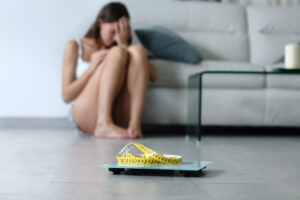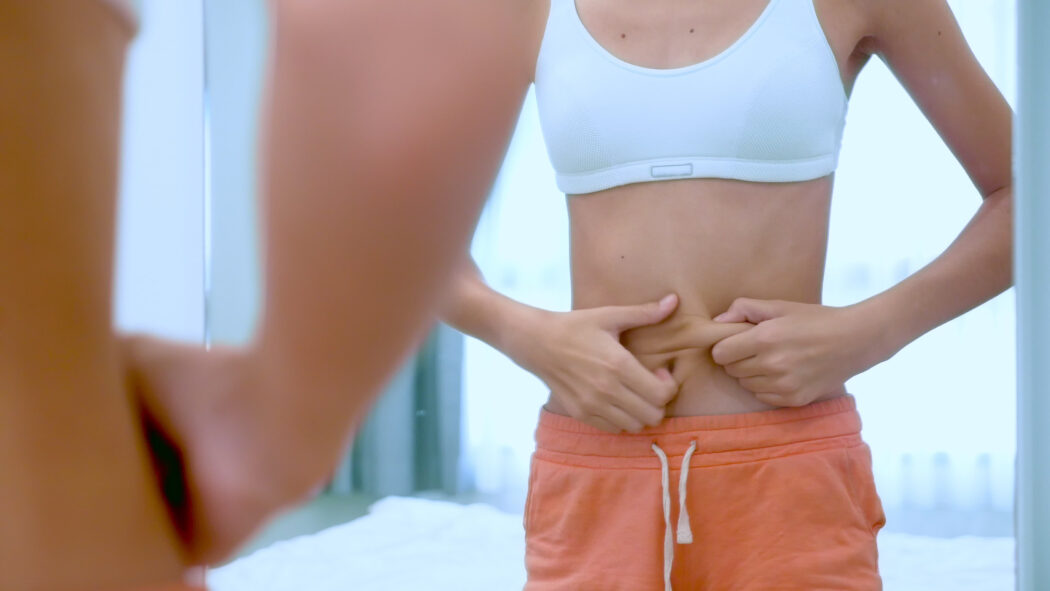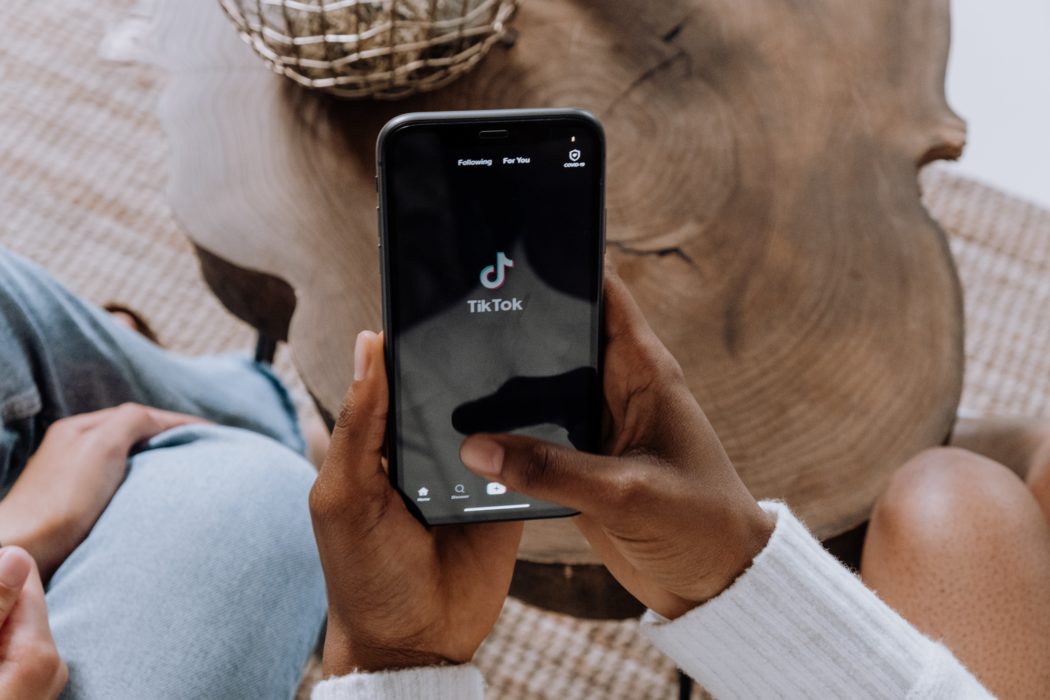Harmful health and fitness advice has the habit of infiltrating social media landscapes, and it looks like TikTok is the newest – and potentially most dangerous – vessel for this advice to run rife.
The average TikTok user spends 52 minutes of their day on the app. That’s over 850 minutes a month, and 18,928 minutes a year. With these statistics in mind, it’s no wonder that TikTok has become the cultural phenomenon it is today – with popularity skyrocketing during the peak of widespread lockdowns, and now garnering approximately 1 billion monthly users – 60% of those belonging to Gen z. Clearly, TikTok has become an indispensable asset in the lives of many children and teens across the globe – but as parents, have you ever questioned the kind of harmful messaging this app could be sending your kids?
At the end of 2019, I opened TikTok for the first time. Periodically opening and closing the app every day, I consumed dance videos, funny skits, ‘daily vlogs’, and other light-hearted content that was inundating my feed. At first it seemed harmless, but it wasn’t until 2020, when plunged into the first of many lockdowns here in Melbourne, that I realised how much TikTok content I was subconsciously absorbing.

Face-to-face with reoccurring bouts of ‘lockdown boredom’, I was continually sucked into the TikTok quicksand of mindless scrolling. I wasn’t alone in this. For 4–15-year-olds, the average scrolling time per day is 80 minutes – a significantly longer chunk of the day than our 52 minutes. Although these statistics may seem shocking, the unlimited stream of consecutive, relatively short videos to scroll through – a 3-minute option only recently introduced – makes extended periods of scrolling much harder to consciously limit.
It’s all in the algorithm.
For a relatively new platform, TikTok has managed to generate a large cultural standing, carving out a previously unmatched space for mass influence.
The addictiveness of the app – a reason it is so popular – can be partly attributed to its cutting-edge algorithm – highly developed in its ability to shape users’ ‘For You’ pages to their unique ‘level of interest’. Indicators like finishing a video from beginning to end, user location and the types of videos users interact with, all contribute to the personalisation of user feeds. However, when the algorithm is pervasively feeding health advice, regardless of its validity, to impressionable children and teens – without their explicit consent to do so – this personalisation has the potential to turn sinister.
Health and Fitness advice is well established in the social media ecosystem. Beginning in Youtube communities, it eventually bled into Instagram feeds and now more recently, TikTok has taken the reigns.

My growing suspicion towards TikTok didn’t begin until I decided to “get back into fitness” – like many did during lockdown – using TikTok’s search bar to source workout ideas and routines. It was then, that the content on my feed slowly began to change. All of a sudden, whenever I opened the app, I was flooded with videos about different workouts, “how to be in a calorie deficit”, and ‘what I eat in a day’ videos, often perpetuated by slim and toned creators, who often didn’t show a realistic amount of food.
Through looking at a couple of workout videos, I was unknowingly placing my “interest” in the health and fitness category on TikTok, which the algorithm then held onto, and adapted the content it showed me to reflect that. Eventually, the content on my TikTok feed extended beyond the workout ideas that I initially sought out, and onto advice about my diet, things I should or shouldn’t be eating or drinking, and different workouts to give me a particular desired body type. I was overwhelmed.
What’s wrong with health and fitness advice?
Although these types of videos may not strike some users as outrightly harmful, the pervasive nature of diet culture and the fitness industry when fed consistently to impressionable users, has the potential to garner harmful perceptions of body image and obsessive behaviours, far too young.
This largely stems from the widely engrained behaviour, of associating morality with different diets or lifestyles. Chocolate is seen as “bad” or “junk”, vegetables are “good” and “clean”, and going to the gym everyday will make you “better than” someone who does not.

By assigning so much moral value to the foods we choose to eat and exercise we choose to do, the likeliness of guilt when we don’t do these things, is much higher. This moral value is ultimately delineated from the fact that a large part of society continues to subconsciously perpetuate fatphobic narratives and maintain thinness as the gold standard for how a woman should look.
These ideals are further exacerbated on TikTok, due to the feedback economy of the platform, whereby comments and likes denote how videos are generally perceived. A recent example of this was called out by Emma Matthews (@sheismarissamatthewss on TikTok), who concluded that the many comments on TikTok “reinforce thin privilege and fatphobia”. She compared the comments of her ‘what I eat in a day video’ – where she got criticised for eating three eggs and using an “inappropriate amount of olive oil” – to the comments of ‘thin’ creators’ food videos, who were predominantly praised for what they eat – therefore demonstrating how users often idealise and favour those who fit into their preferred body type.

Therefore, if teens and tweens manage to get onto the “side” of TikTok swarmed with health and fitness advice, the persistent messaging of the “perfect” diet and lifestyle, has the potential to generate obsessive or harmful relationships with food and exercise, in an attempt to mirror what they see from their favourite creators.
Amid the more latent presentations of diet culture, although more hidden, are pro-anorexia accounts, particularly dangerous in their encouragement of starvation and extreme restriction around food. It was when one of these videos popped up on my TikTok feed, with the caption “If you ate over 1200 calories today you are fat”, that I recognised the true danger of TikTok’s personalised algorithm. I had never searched for this ‘pro-ana’ content, nor expressed any interest in videos on restrictive eating or diets. But it is accounts like these, despite efforts from TikTok to remove them from the platform, have the potential to be grouped into the health and fitness category, and find their way to the “For You Pages” of teens and tweens.
Body image isn’t a new issue.
Concerns around body image in children and adolescents are already an unfortunately common occurrence, with the Mission Australia 2020 Annual Youth Survey reflecting that 33% of participants saw body image as an area of major concern in their lives. Another survey in 2021 showed that out of 93 students, 45% showed a high level of concern for their body image. It is clear the ubiquity of body image concerns in children and adolescents – an issue that is arguably not improved by the persistent nature of TikTok’s algorithm.
Considering previous research that discovered girls ages 5-8, when simply looking at a Barbie Doll, experienced body dissatisfaction and a desire for thinness, it is important to recognise the capacity for TikTok – and social media in general – to project this bombardment of health and fitness advice onto their audience, without regard for the young and vulnerable nature of the users they are targeting.
If looking at a Barbie doll can cause that much harm, think about what a carefully curated selection of targeted health and fitness videos can do.

How do I talk to my kids about this?
The solution to this doesn’t come with banning your kids from TikTok or confiscating their phones upon hearing this information. Our society is saturated with potentially harmful information around health and fitness, and perpetuations of a thin-ideal – but it is the way that kids perceive this information that defines the harm it can cause.
One way that you can help reinforce positive relationships with health and fitness with your children, is by modelling that positive relationship yourself. Some ways parents can do this are:
- Engaging in healthy eating habits yourself: consistently participating in fad diets or outwardly expressing guilt for eating certain foods are behaviours children can pick up on, and implement into their own lifestyles at a later point.
- Making meals a positive and communal experience: research has shown that a frequency in family meals can lead to inverse effects of disordered eating, and better psychological outcomes for children.
- Teaching kids about critical thinking: by explaining how to practice critical thinking while on social media, it becomes easier for children and teens to recognise the misinformation or unhealthy content that they might be exposed to, and purposely disengage with it. Often, parents are also encouraged to watch TikTok’s with their children, and openly talk about the misrepresentation that they see.

I, like many others, have been exposed to the more sinister side of TikTok health and wellness, but through educating myself and talking to others, I have become aware enough about diet culture and health advice, that I can recognise and ignore misinformation. By navigating TikTok with intention and purpose, seeking out trusted sources and shielding myself from the guilt-shrouded influence of diet culture, I am able to be largely unaffected by the persistent messaging of TikTok’s health and fitness community – and I encourage teens and kids using TikTok to do the same.




